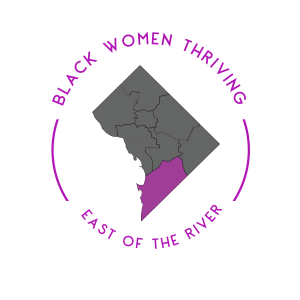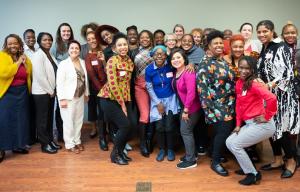
Initiative Empowers Community, Seeks to Improve Quality of Life For Black Women East of the River in Washington, D.C.
Supported by the Jane Bancroft Robinson Foundation, Black Women Thriving East of the River Initiative Begins Implementing Health & Workforce Interventions in DC
WASHINGTON, DC, UNITED STATES, July 20, 2023/EINPresswire.com/ -- A new initiative, Black Women Thriving East of the River, empowered Black women across the Anacostia River to develop interventions that address two of their most pressing challenges: cancer survival and opportunities for quality jobs and careers. Now, with continued support from the Jane Bancroft Robinson Foundation (JBRF), Phase I of the interventions is being implemented and will improve the quality of life in these communities.
Without fanfare, the foundation and women from the community began their work in 2019. The 28 women transitioned from defining and understanding the problems to developing solutions to dismantle harmful systems. The group had diverse backgrounds and lived experiences in healthcare, community service, education, workforce development, and various other specialties. They are physicians, community activists, and non-profit leaders who run
organizations such as Momma’s Safe Haven and the Academy of Hope.
“We mobilized to dismantle inequitable systems by convening community leaders and the most impacted individuals in these neighborhoods,” said Lori Jackson, JBRF’s president. “Through our initiative, the group created a series of specific, actionable interventions to address the root causes of the barriers holding back Black women. We created workgroups to understand better the challenges regarding employment and economic mobility, as well as illness and death from cancer. We forged paths to solutions.”
The group found a clear picture of the suffering caused by health and economic inequities. According to the District of Columbia’s Cancer Control Plan, while overall incidence and mortality rates across DC have declined, disparities persist by race. From 2014-2018, Ward 8 reported the highest cancer incidence rate in DC, with 453 cases. In 2018, the cancer incidence rate was 21.5% higher among Blacks than Whites. Cancer mortality was also highest in Ward 8.
An innovative process developed by Kara Blankner, JBRF’s director of programs, called the Strategic Design Initiative (SDI), provided guidelines for the group’s extraordinary team building, training, and facilitation. Through this groundbreaking process, participants bonded by resolving power dynamics, engaging across cultural differences, and committing to hearing and respecting all voices. It created a friendly and productive work environment.
This year, Nakeisha Neal Jones was hired as executive director of Black Women Thriving East of the River and began implementing the interventions. Jones, a Washington native who grew up in Wards 7 & 8, is a collaborative leader with over 20 years of experience expanding access to education, workforce development, and housing resources for under-represented families and youth. With JBRF pledging over $3 million of support, and a $1m grant from the Greater Washington Community Foundation’s Health Equity Fund, the initiative is moving forward.
Neal Jones said they have launched a scholarship fund for Black women that has raised more than $300,000. The funds will be dispersed to women needing help pursuing health-related and other careers. A wide range of applicants will be considered, such as those seeking licensing, stackable credentials, or professional certificates for medical transcription, community health, or birth doula. In addition, also eligible will be those seeking post-secondary degrees in nursing, dentistry, medical research, or physical therapy, as well as future doctors, surgeons, and dentists. Scholarship recipients will also receive comprehensive case management support and be eligible for discretionary grant dollars to address any obstacles to success that may arise along the way—such as childcare, transportation, program-related costs for a laptop or specialized software, etc.
They are also creating a health careers resource map, including an informative website supporting women seeking health-related careers. The employment resource website will provide support that helps residents effectively identify the jobs and career pathways that best align with their personal and professional goals. The website will include comprehensive career details, including training and support to enter positions and explore different career opportunities. It will consist of information on how they can get training for specific positions and jobs. Neal Jones is also working with the human resources departments of healthcare facilities, learning what posts they hope to fill, now and in the future, and putting together a pipeline that can steer
Black women east of the river towards these positions.
In addition, they are creating a Cancer Patient Bill of Rights that reminds women of their rights when navigating cancer. For instance, many women don’t realize they can ask for second opinions when they question a doctor’s diagnosis.
In the future, Neal Jones said the organization would implement additional components that the group developed, measures such as identifying apprenticeship opportunities, an employer training series, cancer landscape analysis, cancer navigation training, cancer clinical trials training, anti-misogynoir training, a cancer Data Infrastructure Task Force, and much more.
Abby Charles, MPH, Co-chair of the Workforce Development Workgroup and program director at the Institute for Public Health Innovation, called it “absolutely unfair and unjust” that where a person lives can determine their health outcomes.
“In Washington, D.C., for Black women who live in Wards 7 & 8, that's the inequity and the injustice that we see, “she said, adding that they will transform these outcomes by changing systems, policies, and environments.
Shantie Morgan-Palmer, who founded Evelyn’s Closet, which collected and provided clothing to under-resourced residents in the District, said: “I watched my mom overcome breast cancer and watched my grandmother pass from it. I stand as a true testament and an informer. Through Black Women Thriving East of the River, we have been armed with seeds to give to our family and friends. What we have been given is priceless."
Manon Matchett, the initiative’s co-lead and JBRF’s Director of Strategic Partnerships, said the initiative is an opportunity to validate the lived experiences of Black women East of the River.
“This work sets precedents that individuals can provide critical intel on potential solutions to problems in their communities,” she said. “Our effort demonstrates the power of bringing diverse stakeholders together and centering on the realities of day-to-day living. My participation allows me to further invest in improving quality of life experiences for me, my family, and fellow neighbors."
*****
(For print or broadcast interviews, contact Michael Frisby at 202-625-4328 or mike@frisbyassociates.com)
Michael K. Frisby
Frisby & Associates
+1 202-625-4328
mike@frisbyassociates.com
Visit us on social media:
Facebook
LinkedIn
EIN Presswire does not exercise editorial control over third-party content provided, uploaded, published, or distributed by users of EIN Presswire. We are a distributor, not a publisher, of 3rd party content. Such content may contain the views, opinions, statements, offers, and other material of the respective users, suppliers, participants, or authors.




